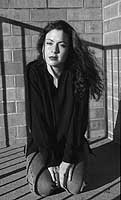|
"There is, in the end, the letting go..." |
||
 |
 |
|
|
Headline: WWREAD.STO Publish Date: 05/13/1992 The usual pretension of Muddy Waters cafe fell away a little with the quiet presence of Jamison C. Mahto. It came back when fellow poet Kevin O'Rourke stood up to read. Review by Marya Hornbacher Two in a group that read at the cafe Friday night, these writers are part of an underground poetry culture in the cities. They do gigs, much in the manner of jazz artists; they write of the city and the night, women, men, pool, poverty, drinking and despair. They are, in O'Rourke's words, the street poets. Carrying an air of urban angst about them, these writers separate themselves from the stock poetry scene in the cities by one clear fact: When these poets write of survival on the streets, they know what they're talking about. Mahto -- the antithesis of every possible artsy stereotype -- started a ``monster'' when he went in search of Native American poets to read in honor of Native American Month. He said the response was amazing, by both artists and ``joints.'' Booked every week for the month of May and beyond, his group now includes writers of varying ethnicities. ``The writing certainly has an element of anger about the oppression in this society,'' Mahto said, ``but it goes beyond that. There's a lot of hope for the future, a lot about the hope and joy on the streets.'' Mahto writes with a steady hand and a clear voice that wastes no time with eloquence. Often a stream of words and images, he creates an atmosphere much like the streets themselves -- fast, flashing, dark. He refers often to his heritage; this is where the emotion comes through most clearly. One of the strongest pieces was ``The Blue Apache,'' a long poem tracing his life, then circling back to his ancestry in a smooth tie that carries the listener along easily. His is writing influenced by both beatnik and Romantic poets; his is work that knows itself. ``The blues is not necessarily despair,'' he read, smiling. ``And I know the difference between night and day.'' Mahto was followed by Marcie Rendon. With short poems that draw on classic poetry tricks a few times too often -- repetition, theme poems, sing-song style -- it was clear that her voice lacked the development of Mahto. But her images were often strong, especially in work that focused on women. Another street poet, her experiences spill over into her writing, more often effectively than not. In ``Inner City Birth Control,'' Rendon writes: ``You ever tried making love to the sound of gunshot and women's screams? It brings new meaning to the words coitus interruptus.'' If Rendon can break out of established poetic patterns, she will be a startlingly strong poet. As will her daughter, Rachel Rendon, who also read. Mahto made a mistake in inviting a poet this green to read -- in her teens, this young woman with extremely promising work nonetheless detracted somewhat from any professional air the reading might have claimed. Rendon's poetry spoke more to the emotion behind all of these writers' work than it did to the caliber of work itself: ``Life is different . . . It is not lying on the dewey grass. It is about survival.'' This was the message spoken by all of the poets. After three had read, the crowd was shifting, leaving, smoking more; the message had been strongly spoken and appreciated. But then Kevin O'Rourke stood up and gave a 20-minute rundown on his life. O'Rourke, the only white poet of the four, made it more than clear that he understood poverty, racism, pain. He made it so clear that several people walked out while he rambled. When he did finally read, the walls shook. He shouted, swore, stomped. He gave a performance that detracted notably from the effect of the previous readers. It also detracted from his work. Looking for shock value, his first several poems were excessively graphic, and his reading style obliterated their imagistic worth. It was not until his fourth piece that he settled down, as though realizing that the piece required a softer touch, and read one of the best pieces of the night. With deft imagery -- ``sleet fills the clefts in the glistening pavement'' -- and a clear grasp of his message -- ``hail Marie, mother of the railroad tracks'' -- O'Rourke is a poet of some talent and far too much posturing. What this reading lacked in professionalism, it made up for in guts. The writers had an honesty and a clarity often missing from other urban writers. Mahto's group readings should become a strong presence on the art circuit. Marya Hornbacher is a reporter for the Daily. |
|